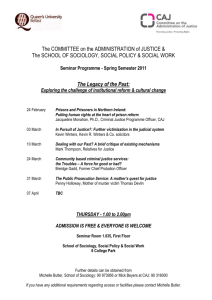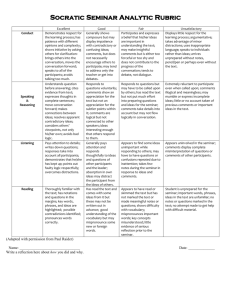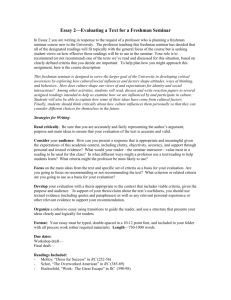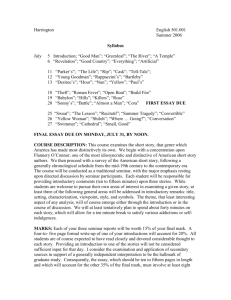Sociology/Rural Sociology 748
advertisement
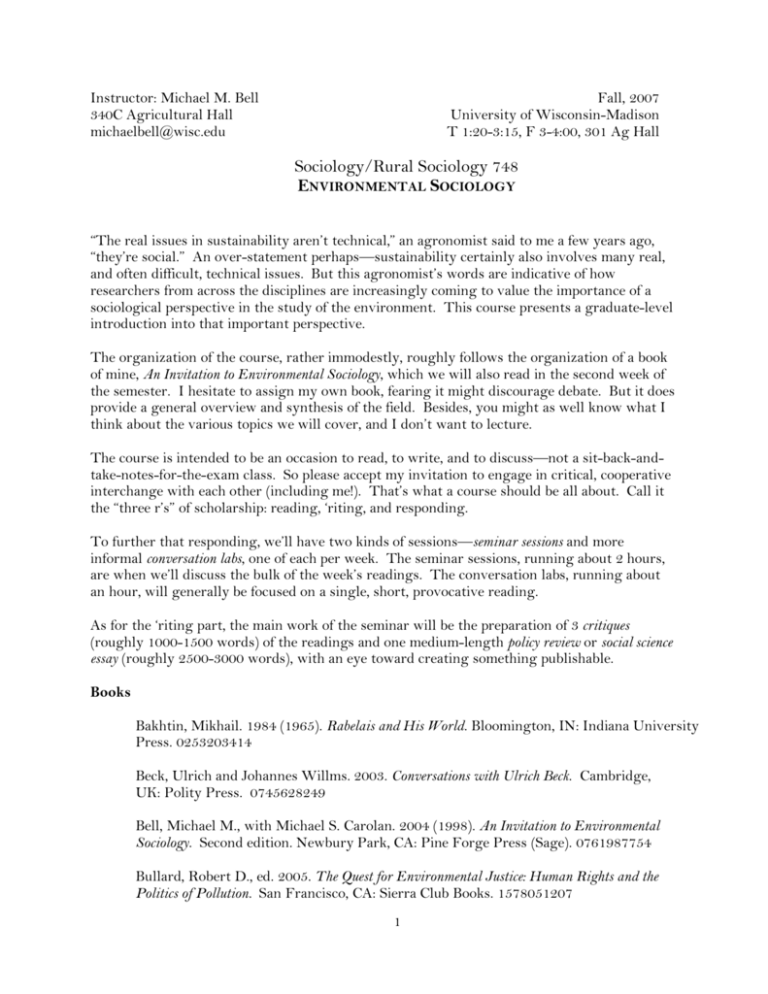
Instructor: Michael M. Bell 340C Agricultural Hall michaelbell@wisc.edu Fall, 2007 University of Wisconsin-Madison T 1:20-3:15, F 3-4:00, 301 Ag Hall Sociology/Rural Sociology 748 ENVIRONMENTAL SOCIOLOGY “The real issues in sustainability aren’t technical,” an agronomist said to me a few years ago, “they’re social.” An over-statement perhaps—sustainability certainly also involves many real, and often difficult, technical issues. But this agronomist’s words are indicative of how researchers from across the disciplines are increasingly coming to value the importance of a sociological perspective in the study of the environment. This course presents a graduate-level introduction into that important perspective. The organization of the course, rather immodestly, roughly follows the organization of a book of mine, An Invitation to Environmental Sociology, which we will also read in the second week of the semester. I hesitate to assign my own book, fearing it might discourage debate. But it does provide a general overview and synthesis of the field. Besides, you might as well know what I think about the various topics we will cover, and I don’t want to lecture. The course is intended to be an occasion to read, to write, and to discuss—not a sit-back-andtake-notes-for-the-exam class. So please accept my invitation to engage in critical, cooperative interchange with each other (including me!). That’s what a course should be all about. Call it the “three r’s” of scholarship: reading, ‘riting, and responding. To further that responding, we’ll have two kinds of sessions—seminar sessions and more informal conversation labs, one of each per week. The seminar sessions, running about 2 hours, are when we’ll discuss the bulk of the week’s readings. The conversation labs, running about an hour, will generally be focused on a single, short, provocative reading. As for the ‘riting part, the main work of the seminar will be the preparation of 3 critiques (roughly 1000-1500 words) of the readings and one medium-length policy review or social science essay (roughly 2500-3000 words), with an eye toward creating something publishable. Books Bakhtin, Mikhail. 1984 (1965). Rabelais and His World. Bloomington, IN: Indiana University Press. 0253203414 Beck, Ulrich and Johannes Willms. 2003. Conversations with Ulrich Beck. Cambridge, UK: Polity Press. 0745628249 Bell, Michael M., with Michael S. Carolan. 2004 (1998). An Invitation to Environmental Sociology. Second edition. Newbury Park, CA: Pine Forge Press (Sage). 0761987754 Bullard, Robert D., ed. 2005. The Quest for Environmental Justice: Human Rights and the Politics of Pollution. San Francisco, CA: Sierra Club Books. 1578051207 1 Latour, Bruno. 2004. Politics of Nature: How to Bring the Sciences into Democracy. Catherine Porter, trans. Cambridge, MA: Harvard University Press. 0674013476 Schor, Juliet. 2005. Born to Buy: The Commercialized Child and the New Consumer Culture. New York: Scribner. 0684870568 Taylor, Peter. 2005. Unruly Complexity: Ecology, Interpretation, Engagement. University of Chicago Press. 0226790363 A Note on Student Evaluation Your grade for this course will be based on the following: the three critiques (33%), the final paper (33%), and class participation (33%). A Note on the Critiques The point of the critiques is to give you a chance to develop your own views on the readings, to communicate those views to the class, and to demonstrate your command of what we’ve read thus far. The format is simple: Write a critical appraisal of some particular theme in the readings—and email the result to the class. The critiques will be discussed in class in small groups. The best critiques will be those that a), aptly capture the selected theme; and b) develop a coherent and distinctive argument about that theme. Give your critique a title and a reference section. Also, note that each critique should emphasize the course material of the preceding third of the course. You may rewrite your critiques as often as you like, should you be unsatisfied with your grade. The critiques are due, in turn, on September 29th, October 27th, and December 1st. A Note on the Final Paper The central written work of the course will be the preparation—and possible submission—of a 2500-3000 word (about 10 to 12 double-spaced pages) policy review or social science essay for the journal Society and Natural Resources. This is both easier and harder then it sounds. On the easy side is that you do not have to spend months interviewing and running regression analyses to write a publishable policy review or essay. The hard side of all this, though, is that such pieces generally require a far higher level of writing and theoretical reasoning then a piece that mainly reports research findings. Thus, the best papers will be those that exhibit good writing and that develop your own lines of reasoning, and not merely report on those of others. As to topic, I will welcome anything that would be of interest to environmental sociology and that fits with the description of policy reviews and essays that Society and Natural Resources invites, which is as follows: “Policy Reviews and Essays: Policy Reviews examine current or proposed policies associated with natural resource management. These articles can raise questions of policy, propose alternative action, or critique current or proposed policy. An essay is a creative article discussing social science issues related to natural resources or the environment. Total length of these manuscripts should not exceed 12 double spaced, typed pages.” Please note that the “first musings” on your policy review or essay is due October 13th, and a second musings with preliminary bibliography is due November 10th. We will be discussing 2 everyone’s first draft in class during the final two weeks of the course. Your completed first draft is due via email to the entire class 48 hours before the session in which it is to be discussed. The final draft is due December 19th by 5pm. A Note on Discussion Format The bulk of each class session will be devoted to an open discussion of the day’s reading. Each discussion will be conducted as a kind of thematic “pot luck” in which each seminar participant is expected to bring to the class a few thoughts on the significance of the readings, plus a discussion question or two. We’ll begin the discussion on the day’s readings by “setting the table” of our pot luck, going around the room and gathering everyone’s thoughts and discussion questions in turn. Some classes, however, the readings may be a bit baffling, requiring some translation of the day’s menu, as it were. If necessary, we will take some time for that, before setting the table with everyone’s pot-luck items. The daily pattern will thus normally be as follows: • • • • translating the menu, if necessary “setting the table” the “feast”—open discussion preview of readings for next time A Note on Class Participation Your grade for class participation will not be a measure of how loud you were, or of how often you spoke. Rather, it will reflect the extent to which you were “there.” I will evaluate your “thereness” based equally on 1) your engagement (including the quality of your listening) in class discussions; 2) attendance; 3) your participation in “table setting”; 4) your engagement with the written work of other seminar members during in-class small-group discussions of critiques and during the whole-class discussion of policy reviews and essays during the final two weeks of term. Grading in this area will be based on the initial assumption that everyone will get full credit in all areas of participation, with deductions made for negligent or “unthere” performance, if necessary. A Note on Getting Ahold of the Books and Readings All of the books for the course are available at the Rainbow Cooperative, 426 West Gilman Street. The other readings will all be available at the course web site. 3 COURSE SCHEDULE Week One: Introduction 9/4 Seminar No reading. 9/7 Conversation Lab Wikipedia. 2006. “Environmental Sociology” in Wikipedia—The Free Encyclopedia. The Moral Week Two: Envisioning Environmental Sociology 9/11 Seminar Bell, Michael M. 2004. An Invitation to Environmental Sociology. Second edition (with Michael S. Carolan). 9/14 Conversation Lab Stiles, Kaelyn and Michael Mayerfeld Bell. 2004. “About the Book—and Figure 1.1—and the Cover,” in Instructor’s Manual for An Invitation to Environmental Sociology, second edition, pp. 1-6. Week Three: The Realist-Constructionist Debate 9/18 Seminar Carolan, Michael S. 2005. “Society, Biology and Ecology: Bringing Nature Back into Sociology’s Disciplinary Narrative through Critical Realism.” Organization and Environment. Freudenburg, William R., Scott Frickel and Robert Gramling. 1995. “Beyond the Nature/Society Divide: Learning to Think about a Mountain,” Sociological Forum 10: 361-392. Murphy, Raymond. 2004. “Disaster or Sustainability: The Dance of Human Agents with Nature's Actants.” Canadian Review of Sociology and Anthropology 41(3): 249-266. 9/21 Conversation Lab Evanoff, Richard J. 2005. “Reconciling Realism and Constructivism in Environmental Ethics.” Environmental Values 14(1): 61-81. First critique due 10/1. 4 The Material Week Four: The Treadmill of Consumption 9/25 Seminar Schor, Juliet. 2005. Born to Buy: The Commercialized Child and the New Consumer Culture. New York: Scribner. 9/28 Conversation Lab Sahlins, Marshall. 1972. “The Original Affluent Society,” in Stone Age Economics. New York: Aldine. Pp. 1-39. First critique due 9/28. Week Five: The Treadmill of Production 10/2 Seminar Gould, Kenneth, David N. Pellow, and Allan Schnaiberg. 2004. “Interrogating the Treadmill of Production: Everything You Wanted to Know about the Treadmill but Were Afraid to Ask.” Organization and Environment 17(3): 296-316. O’Connor, James. 1991. “On the Two Contradictions of Capitalism.” Capitalism, Nature, Socialism 2 (3, Oct.): 107-109. Foster, John Bellamy. 1999. “Marx’s theory of metabolic rift: classical foundations for environmental sociology.” American Journal of Sociology 105:2:366-405. 10/5 Conversation Lab Jevons, William Stanley. 2001 (1865). “On the Economy of Fuel.” Organization and Environment 14(1): 99-104. First musings on policy review due. Week Six: Critiquing the Treadmill 10/9 Seminar Bell, Michael M. 2006. “Welcome to the Consumption Line: Sustainability and the PostChoice Economy.” Paper delivered at the Sustainable Consumption and Society conference, Madison, WI, June 3, 2006. 18pp. Freudenburg, William. 2005. “Privileged Access, Privileged Accounts: Toward a Socially Structured Theory of Resources and Discourses.” Social Forces, 84(1): 89-114. Foster, John Bellamy. 2005. “The Treadmill Of Accumulation: Schnaiberg’s Environment and Marxian Political Economy.” Organization and Environment 18: 7-18. Wright, Eric O. 2004. “Interrogating the Treadmill of Production: Some Questions I Still Want to Know About and Am Not Afraid to Ask.” Organization and Environment 17(3): 317322. 5 10/12 Conversation Lab Mol, Arthur P. J. and Gert Spaargaren. 2005. “From Additions and Withdrawals to Environmental Flows: Reframing Debates in the Environmental Social Sciences.” Organization and Environment 18: 91-107. Week Seven: The Great Population and Sustainability Debate: The Ghost of Malthus? 10/16 Seminar Chapman, Robert. 1999. “No Room at the Inn, or Why Population Problems Are Not All Economic.” Population and Environment 21(1): 81-97. Hardin, Garrett. 1992. “The Ethics of Population Growth and Immigration Control.” Pp. 6-7 in Crowding Out the Future: World Population Growth, US Immigration, and Pressures on Natural Resources, Robert W. Fox and Ira H. Melham, eds. Washington, DC: Federation for American Immigration Reform. Malthus, Robert Thomas. 1976 (1798). “Preface” and “Chapter 1.” Pp. 15-21 in An Essay on the Principle of Population. Philip Appleman, ed. New York: Norton. Sen, Amartya. 1981. “The Great Bengal Famine,” pp. 52-85 in Poverty and Famines: An Essay on Entitlement and Deprivation. Oxford: Clarendon Press. Simon, Julian L. 1980. “Resources, Population, Environment: An Oversupply of False Bad News.” Science 208 (#4451, June 27): 1431-37. 10/19 Conversation Lab Hardin, Garrett. 1968. “The Tragedy of the Commons.” Science 162 (13 Dec.): 1243-48. Second critique due. The Ideal Week Eight: The Cultural Origins of Environmental Domination 10/23 Seminar Bakhtin, Mikhail. 1984 (1965). Rabelais and His World. Bloomington, IN: Indiana University Press. 10/26 Conversation Lab Banerjee, Damayanti and Michael M. Bell. (In press; forthcoming, 2007.) “Ecogender: Locating Gender in Environmental Social Science.” Society and Natural Resources. 19pp. Week Nine: The Rise of Concern for the Environment 10/31 Seminar Beck, Ulrich and Johannes Willms. 2003. Conversations with Ulrich Beck. Cambridge, UK: Polity Press. 6 11/2 Conversation Lab Inglehart, Ronald. 1995. “Public Support for Environmental Protection: Objective Problems and Subjective Values in 43 Societies.” PS: Political Science and Politics 28(1):57-72. Second musings on policy review due, with preliminary bibliography. Week Ten: What Is Nature Anyway? 11/6 Seminar Cronon, William. 1995. “The Trouble with Wilderness, or, Getting Back to the Wrong Nature.” Pp. 69-90 in Uncommon Ground: Toward Reinventing Nature, William Cronon, editor. New York: W.W. Norton. Williams, Raymond. 1980 (1972). “Ideas of Nature,” in Problems in Materialism and Culture. London: Verso. Pp. 67-85. 11/9 Conversation Lab Bell, Michael Mayerfeld. 1994. “The Natural Conscience,” pp. 137-157 in Childerley: Nature and Morality in a Country Village. Chicago: University of Chicago Press. The Practical Week Eleven: Putting Things Back Together I: Actor Network Theory 11/13 Seminar Latour, Bruno. 2004. Politics of Nature: How to Bring the Sciences into Democracy. Catherine Porter, trans. Cambridge, MA: Harvard University Press. 11/16 Conversation Lab Wainwright, Joel. 2005. “Politics of Nature: A Review of Three Recent Works by Bruno Latour.” Capitalism, Nature, Socialism 16(1):115-122. Week Twelve: Putting Things Back Together II: Complexity Theory 11/20 Seminar Taylor, Peter. 2005. Unruly Complexity: Ecology, Interpretation, Engagement. University of Chicago Press. Thanksgiving Break Week Thirteen: A Just Environment 11/27 Seminar Bullard, Robert D., ed. 2005. The Quest for Environmental Justice: Human Rights and the Politics of Pollution. San Francisco, CA: Sierra Club Books. 11/30 Conversation Lab Wikipedia. 2006. “Environmental Sociology” in Wikipedia—The Free Encyclopedia. Third critique due. 7 Weeks Fourteen and Fifteen 12/7, 12/8, 12/14, 12/15 In-class discussion of policy reviews and essays. First draft of policy review or essay due via email to entire class 48 hours before the class in which it is to be discussed. Final Due Date for All Work December 19th, 5pm. 8

